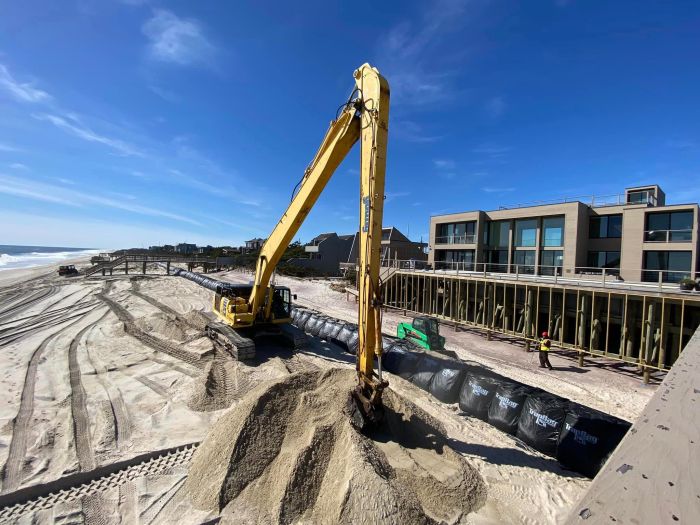Meet the new boss, same as the old boss.

Ex-U.S. Secretary of Interior Ryan Zinke proved critics right when he resigned from his scandal-plagued tenure in January under of cloud of ethics probes. It was just shy of two years after he took over the parent agency of the National Park Service (NPS), which oversees Fire Island National Seashore (FINS), among many other things. On April 11, the GOP-led U.S. Senate voted 56-41 to confirm President Donald Trump’s pick to replace Zinke: Former oil lobbyist David Bernhardt, Zinke’s former deputy whose conflicts of interest the Interior’s inspector general began investigating four days later.
“I believe public trust is a public responsibility, and maintaining ethical culture is critical,” Bernhardt, who The Washington Post reported carries around a card to keep track of his many potential conflicts of interest, told the Senate during his confirmation hearing in March. “I know how important and how devastating it is when folks at the top act in an unethical manner.”
Besides overseeing NPS – of which FINS is one of more than 400 units – Bernhardt also oversees nine other agencies under the Department of Interior umbrella, including the U.S. Fish and Wildlife Service, U.S. Geological Survey (USGS) and Bureau of Ocean Energy Management (BOEM), which also have sway over FI’s future. He takes over the Interior as a proposed wind farm for off the coast of FI is pending and a federally funded Sandy reconstruction project to renourish the beach is nearing completion.
Zinke was the fourth member of Trump’s cabinet to resign due to ethics complaints in two years following the departures of Health and Human Services Secretary Tom Price, Veterans Affairs Secretary David Shulkin, and Environmental Protection Agency Administrator Scott Pruitt.
As the News has reported, Bernhardt’s predecessor Zinke had made quick work of rolling back environmental protections. He lifted a ban on hunters using lead bullets in wildlife refuges meant to prevent lead poisoning in wildlife, scrapped rules governing fracking on public lands, scrubbed his agencies’ materials from mention of climate change, rescinded an order calling on NPS to prioritize climate change, and shuttered USGS’ science center that studies climate change. Also under Zinke, the Bureau of Land Management (BLM), another unit of the Interior, delayed rules that would have prevented 200,000 tons of methane pollution annually from oil and gas wells on federally managed lands.
Zinke also oversaw the largest oil and gas lease sale in U.S. history –77 million acres in federal waters in the Gulf of Mexico – and launched a five-year development plan for offshore oil and gas drilling in the Arctic, Gulf and Atlantic, including off the Fire Island coast, sparking local opposition. But Bernhardt has shelved that plan while the department awaits an appeals court ruling in its attempt to overturn a federal judge’s ruling favoring a lawsuit blocking the move.
The controversy that reportedly prompted the White House to request Zinke’s resignation was a real estate deal involving the former Republican congressman’s wife and oil company Halliburton in his Montana hometown that the inspector general referred to the U.S. Department of Justice. He had faced 15 other investigations for conduct including allowing his wife to join him in official vehicles in violation of department rules and chartering $12,375 worth of flights that “could have been avoided,” according to the inspector general. Wasting taxpayer money on travel was also a theme in the resignations of Price, Shulkin, and Pruitt.
“After 30 years of public service, I cannot justify spending thousands of dollars defending myself and my family against false allegations,” Zinke said in a statement announcing his resignation. “It is better for the president and Interior to focus on accomplishments rather than fictitious allegations.”
Less than two weeks after his departure, Zinke was hired as managing director of Artillery One, an investment firm that specializes in the energy and technology sectors. And three months after he left, he was appointed to the board of directors of U.S. Gold, a mining firm.
As for Bernhardt, the new Interior chief drew immediate calls from Democratic lawmakers urging the inspector general to probe his conduct. Among the issues at hand were allegations that he weakened protections on an endangered fish to help a former lobbying client, continued lobbying for a client after he filed paperwork indicating that he was no longer working as a lobbyist, and blocked the release of a scientific report showing how pesticides threaten hundreds of endangered species, according to The New York Times.
Or, as Trump tweeted, “David has done a fantastic job from the day he arrived.”






























